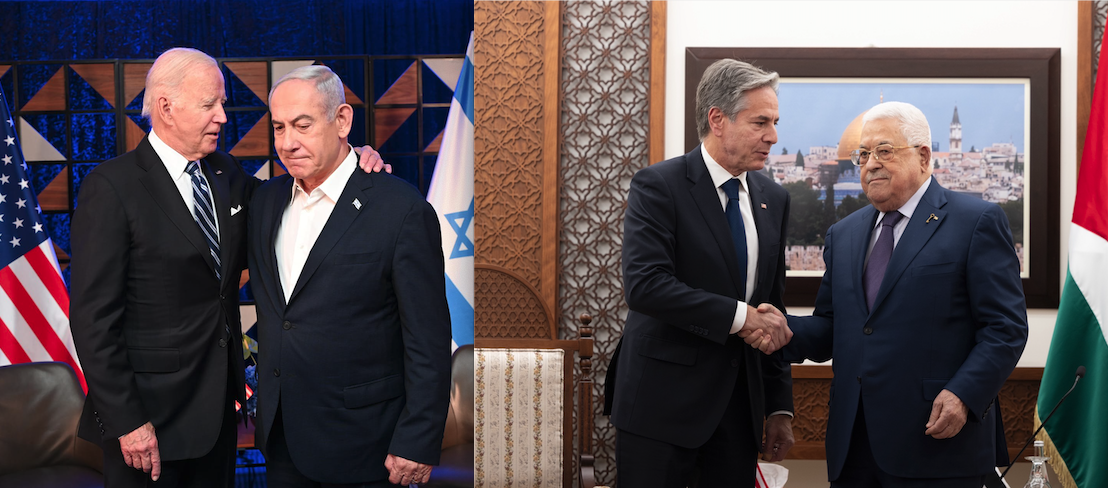
Published 11/08/2023 17:58 | Edited 11/09/2023 14:08
This Tuesday (7), the White House issued a warning to Israel, urging it not to reoccupy the Gaza Strip after the current conflict ends. White House national security spokesman John Kirby said: “The president maintains his position that reoccupation by Israeli forces is not the right thing to do.” That warning came in response to suggestions from Israeli Prime Minister Benjamin Netanyahu that Israel could take on an undefined security role in the region after the fighting ends.
Netanyahu mentioned in an interview with ABC News that Israel would have “overall responsibility for the security” of Gaza after the departure of Hamas, which currently controls the territory. “We’ve seen what happens when we don’t have” responsibility for Gaza’s security, Netanyahu said. US President Joe Biden had already expressed that it would be a big mistake for Israel to reoccupy Gaza, emphasizing that a post-conflict Gaza cannot be governed by Hamas, a group designated as terrorist by the US and the European Union.
“The president maintains his position that reoccupation by Israeli forces is not the right thing to do,” John Kirby, White House national security spokesman, told reporters. President Biden previously said it would be “a big mistake” for Israel to reoccupy Gaza, from which it withdrew in 2005.
Kirby also said the White House “keeps in our thoughts and prayers the many, many thousands of innocent Palestinians who have been killed in the conflict since October 7, and many more who have been wounded and wounded in the conduct of the operations. We are also aware of this suffering,” he said.
While the US has been steadfast in its support for Israel since the Hamas attack, it is also pushing for humanitarian pauses and the protection of Palestinian civilians. As the humanitarian crisis in Gaza deepens, the United States has increasingly tried to balance its support for Israel with calls for the protection of Palestinian noncombatants and “humanitarian pauses” in the fighting.
The Israeli prime minister indicated he would consider “short tactical pauses” of one hour to allow for the entry of humanitarian aid and the release of Hamas hostages. Asked if he considered this sufficient, the White House spokesperson stated that this is in line with the conversations that have been taking place.
Blinken: Gaza must be governed by Palestinians
US Secretary of State Antony Blinken offered the Biden administration’s comprehensive overview of the situation in Gaza, urging Israel to avoid an indefinite occupation and lay the foundation for lasting peace. After a month of devastating war in Gaza, the situation has become increasingly complex, with Israeli forces advancing deeper into the territory. Blinken is in Tokyo for a meeting of the G7, the countries with the largest economies in the world.
Blinken highlighted the importance of beginning diplomatic efforts immediately to set the stage for a stable peace after the current conflict. He emphasized that it is crucial that Israel avoid any suggestion of an unlimited occupation of Gaza. Israeli Prime Minister Benjamin Netanyahu has faced criticism for failing to present a clear plan for governing Gaza following the possible ouster of Hamas, which has governed the territory since 2007.
“The only way to ensure this crisis never happens again is to begin to establish the conditions for lasting peace and security and frame our diplomatic efforts now with that in mind,” Blinken told reporters in Tokyo.
US officials have expressed nervousness about Israeli plans for a post-conflict Gaza, especially after Netanyahu’s comments about possible Israeli responsibility for Gaza’s security “for an indefinite period”. Blinken emphasized that the US administration wants to guarantee other forms of protection for Gazans.
The US Secretary of State outlined key elements that, in his opinion, should not be present in a post-conflict agreement, including the forced displacement of Palestinians from Gaza, the use of Gaza as a platform for terrorism or violent attacks, reoccupation of Gaza after the end of the conflict, attempts to blockade or besiege Gaza and reduction of Gaza’s territory. The way he details this is a clear message to Netanyahu and his ambitions.
Blinken also reinforced the need for the Palestinian people to play a fundamental role in the governance of Gaza and the West Bank, as well as the importance of establishing the conditions for lasting peace and security. He highlighted the need for Palestinian-led governance, unification of Gaza with the West Bank under the Palestinian Authority, and a sustained mechanism for reconstruction in Gaza. Furthermore, Blinken emphasized the importance of Israelis and Palestinians living side by side with equal measures of security, freedom, opportunity and dignity.
While G-7 countries have endorsed the US call for “humanitarian pauses” to facilitate assistance and the release of hostages in Gaza, the situation remains complex. Israeli forces have advanced into Gaza City, raising concerns about rising civilian casualties. International pressure for a permanent suspension of hostilities continues as Arab and European leaders express concerns and divisions over the best approach to the ongoing conflict. The situation in Gaza remains uncertain, with a growing number of victims and uncertainty about the future.
Blinken traveled to Japan after visiting the Middle East and speaking with regional leaders about the conflict. It was a visit without immediate victories, as he faced Israeli refusal to stop its fight and the anger of Arab countries that the Biden administration continued to support Israel despite the rising civilian death toll, which this week surpassed 10,000 people, according to the Gaza Ministry of Health.
Source: vermelho.org.br

